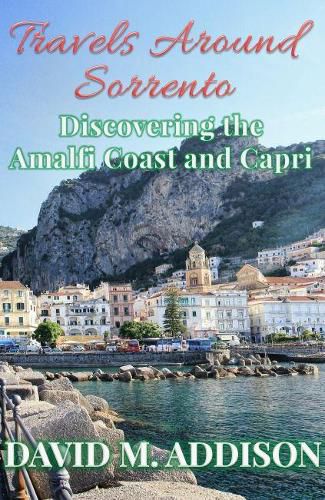Readings Newsletter
Become a Readings Member to make your shopping experience even easier.
Sign in or sign up for free!
You’re not far away from qualifying for FREE standard shipping within Australia
You’ve qualified for FREE standard shipping within Australia
The cart is loading…






This title is printed to order. This book may have been self-published. If so, we cannot guarantee the quality of the content. In the main most books will have gone through the editing process however some may not. We therefore suggest that you be aware of this before ordering this book. If in doubt check either the author or publisher’s details as we are unable to accept any returns unless they are faulty. Please contact us if you have any questions.
David Addison may well have been looking forward to a relaxing time on his Italian holiday, but alas it was not to be. Revisiting Pompeii, he explores Herculaneum and continues the Roman theme by visiting the Villa Jovis in Capri, from which eyrie the dissipated Tiberius ran the empire. In addition, there was Vesuvius to climb, the Amalfi coast to drive and, not least, Sorrento to shop.
Right from the start, he gets off on the wrong foot with a Mafioso maitre d’ which makes mealtimes an ordeal. Not to be outdone, his wife–the formidable La Belle Sans Merci–finds her own pet hate in the form of a glamorous fellow guest.
Ubiquitous Dutchmen, dictatorial minibus drivers and a belligerent boor are just some of the many other characters who enliven this humorous look at Italian life and culture, both in the present and the past. As in Travels Through Time in Italy , the author continues to thwart his long-suffering wife’s attempt to make him more cultured and refined… but anyone could have told her she was on a mission impossible with someone who has a dress sense like his and a close, even symbiotic, relationship with the gin bottle. If anything, he gets himself into even deeper scrapes than before and somehow manages to embarrass her even more.
But when it comes to travelling back to the ancient past and the time of the Romans, the author enters into the spirit of things by letting his fertile imagination roam.
$9.00 standard shipping within Australia
FREE standard shipping within Australia for orders over $100.00
Express & International shipping calculated at checkout
This title is printed to order. This book may have been self-published. If so, we cannot guarantee the quality of the content. In the main most books will have gone through the editing process however some may not. We therefore suggest that you be aware of this before ordering this book. If in doubt check either the author or publisher’s details as we are unable to accept any returns unless they are faulty. Please contact us if you have any questions.
David Addison may well have been looking forward to a relaxing time on his Italian holiday, but alas it was not to be. Revisiting Pompeii, he explores Herculaneum and continues the Roman theme by visiting the Villa Jovis in Capri, from which eyrie the dissipated Tiberius ran the empire. In addition, there was Vesuvius to climb, the Amalfi coast to drive and, not least, Sorrento to shop.
Right from the start, he gets off on the wrong foot with a Mafioso maitre d’ which makes mealtimes an ordeal. Not to be outdone, his wife–the formidable La Belle Sans Merci–finds her own pet hate in the form of a glamorous fellow guest.
Ubiquitous Dutchmen, dictatorial minibus drivers and a belligerent boor are just some of the many other characters who enliven this humorous look at Italian life and culture, both in the present and the past. As in Travels Through Time in Italy , the author continues to thwart his long-suffering wife’s attempt to make him more cultured and refined… but anyone could have told her she was on a mission impossible with someone who has a dress sense like his and a close, even symbiotic, relationship with the gin bottle. If anything, he gets himself into even deeper scrapes than before and somehow manages to embarrass her even more.
But when it comes to travelling back to the ancient past and the time of the Romans, the author enters into the spirit of things by letting his fertile imagination roam.